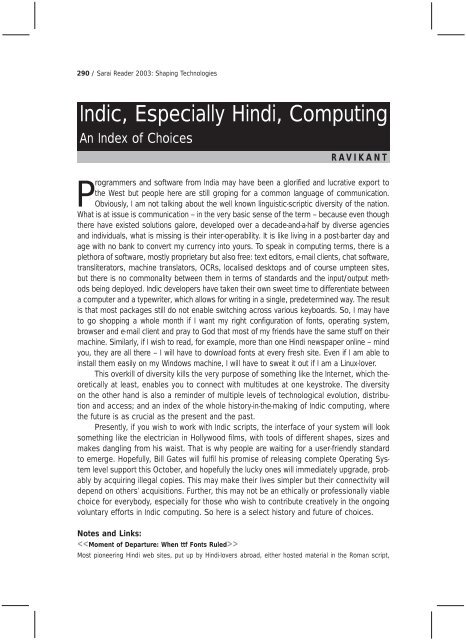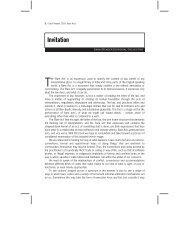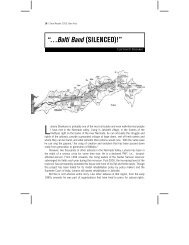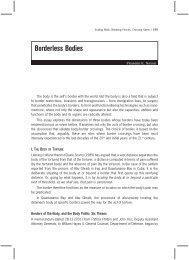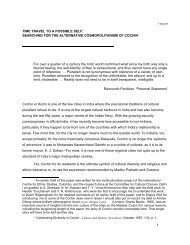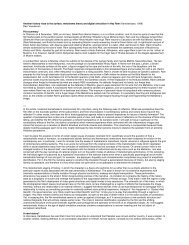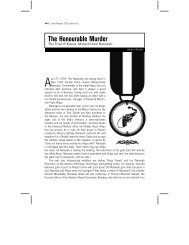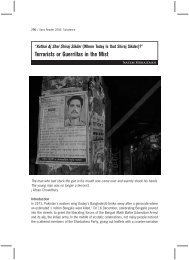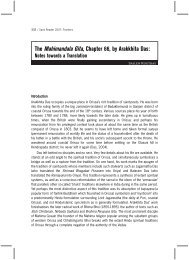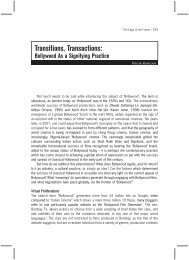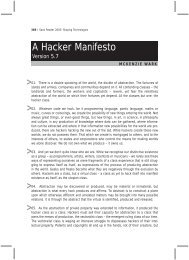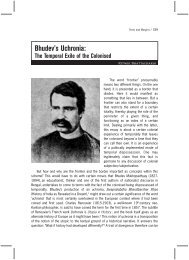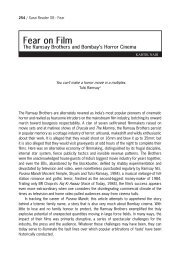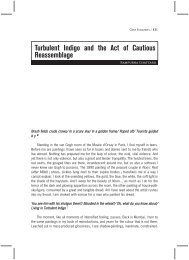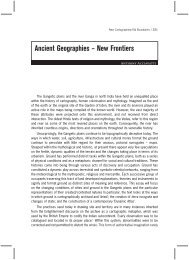Indic, Especially Hindi, Computing - Sarai
Indic, Especially Hindi, Computing - Sarai
Indic, Especially Hindi, Computing - Sarai
Create successful ePaper yourself
Turn your PDF publications into a flip-book with our unique Google optimized e-Paper software.
290 / <strong>Sarai</strong> Reader 2003: Shaping Technologies<br />
<strong>Indic</strong>, <strong>Especially</strong> <strong>Hindi</strong>, <strong>Computing</strong><br />
An Index of Choices<br />
Programmers and software from India may have been a glorified and lucrative export to<br />
the West but people here are still groping for a common language of communication.<br />
Obviously, I am not talking about the well known linguistic-scriptic diversity of the nation.<br />
What is at issue is communication – in the very basic sense of the term – because even though<br />
there have existed solutions galore, developed over a decade-and-a-half by diverse agencies<br />
and individuals, what is missing is their inter-operability. It is like living in a post-barter day and<br />
age with no bank to convert my currency into yours. To speak in computing terms, there is a<br />
plethora of software, mostly proprietary but also free: text editors, e-mail clients, chat software,<br />
transliterators, machine translators, OCRs, localised desktops and of course umpteen sites,<br />
but there is no commonality between them in terms of standards and the input/output methods<br />
being deployed. <strong>Indic</strong> developers have taken their own sweet time to differentiate between<br />
a computer and a typewriter, which allows for writing in a single, predetermined way. The result<br />
is that most packages still do not enable switching across various keyboards. So, I may have<br />
to go shopping a whole month if I want my right configuration of fonts, operating system,<br />
browser and e-mail client and pray to God that most of my friends have the same stuff on their<br />
machine. Similarly, if I wish to read, for example, more than one <strong>Hindi</strong> newspaper online – mind<br />
you, they are all there – I will have to download fonts at every fresh site. Even if I am able to<br />
install them easily on my Windows machine, I will have to sweat it out if I am a Linux-lover.<br />
This overkill of diversity kills the very purpose of something like the Internet, which theoretically<br />
at least, enables you to connect with multitudes at one keystroke. The diversity<br />
on the other hand is also a reminder of multiple levels of technological evolution, distribution<br />
and access; and an index of the whole history-in-the-making of <strong>Indic</strong> computing, where<br />
the future is as crucial as the present and the past.<br />
Presently, if you wish to work with <strong>Indic</strong> scripts, the interface of your system will look<br />
something like the electrician in Hollywood films, with tools of different shapes, sizes and<br />
makes dangling from his waist. That is why people are waiting for a user-friendly standard<br />
to emerge. Hopefully, Bill Gates will fulfil his promise of releasing complete Operating System<br />
level support this October, and hopefully the lucky ones will immediately upgrade, probably<br />
by acquiring illegal copies. This may make their lives simpler but their connectivity will<br />
depend on others’ acquisitions. Further, this may not be an ethically or professionally viable<br />
choice for everybody, especially for those who wish to contribute creatively in the ongoing<br />
voluntary efforts in <strong>Indic</strong> computing. So here is a select history and future of choices.<br />
Notes and Links:<br />
<br />
RAVIKANT<br />
Most pioneering <strong>Hindi</strong> web sites, put up by <strong>Hindi</strong>-lovers abroad, either hosted material in the Roman script,
ASCII-based transliterations, adopted Shusha fonts, devised their own fonts, or put up stuff as .pdf or .jpg<br />
images. The phonetic nature of Shusha came in handy for expatriate programmers working primarily with the<br />
qwerty keyboard. For samples see: www.manaskriti.com/kaavyaalaya.com; www.abhivyakti-hindi.org;<br />
www.anubhuti-hindi.org; www.hindinest.com – all of which run on Shusha.<br />
For popular transliterators ITRANS and JTRANS go to: http://www.aczone.com/itrans/ and http://www.<br />
sibal.com/sandeep/jtrans/<br />
The Devnag package of LaTex, for both Linux and Windows, has been usefully tested for publishing, printing<br />
and web hosting. For downloads visit: http://www.tex.ac.uk/tex-archive/languages/devanagari/<br />
For a fairly comprehensive listing of Devanagari fonts and links to their sources see: http://www.<br />
cs.colostate.edu/~malaiya/devafonts.htm<br />
If you are looking for Mac phonetic fonts go to: http://www.flash.net/~patelvk/<strong>Hindi</strong>.html<br />
Some other good links for fonts are: http://theory.theory.tifr.res.in/bombay/history/people/language/<br />
hindi.html and http://rkk@acharya.iitm.ac.in/ind_fonts.html<br />
Recently, www.akruti.com released a set of Indian language fonts under GPL, also accessible at http://fsf.org.in/<br />
software/software.html<br />
<br />
Baraha 5.0 (www.baraha.com) for Windows is a fair use ware, for phonetic word processing in Kannada,<br />
Marathi and <strong>Hindi</strong>. The problem is you cannot selectively write or edit directly, you have to go through a transliterator.<br />
I-leap is another multilingual, versatile tool which, like Baraha, allows for Unicode conversion.<br />
http://tdil.mit.gov.in/humis/download/menu.htm offers a host of free downloads including fonts, keyboards<br />
and, if you like officious <strong>Hindi</strong>, a technical glossary as well. An advanced commercial version of this multilingual<br />
package is Indiapage from www.mithi.com<br />
<br />
Encode + Decode / 291<br />
In the context of the unacceptability of the ISCII standard, the emergence of Unicode is a viable long-term option<br />
and both corporate companies and free software communities are working hard to develop solutions based on<br />
Unicode. It has the potential of making computing platform-independent and therefore exchange and circulation<br />
of information easy. For basic information and debates see: www.unicode.org; http://www.alanwood.net/unicode/devanagari.html<br />
and itm.ac.in/multi_sys/uni_iscii.html<br />
Unicode support comes bundled with Windows/XP 2000. For phonetic typing one can use the free Takhti<br />
from http://www.geocities.com/hanu_man_ji/ or the DevromU (developed by Bob Eaton) keymap along with<br />
keyman 6.0; or the wide ranging Aksharmala solutions (www.aksharmala.com). On the other hand Yudit<br />
(http://www.yudit.org/) is an excellent multilingual, multi-keyboard text editor that works better for Linux machines.<br />
Unicode has facilitated the development of standardised desktops across Indian languages. One can see<br />
the status of translations and downloadable packages at: http://indic-computing.sourceforge.net and http://<br />
www.indlinux.org/


